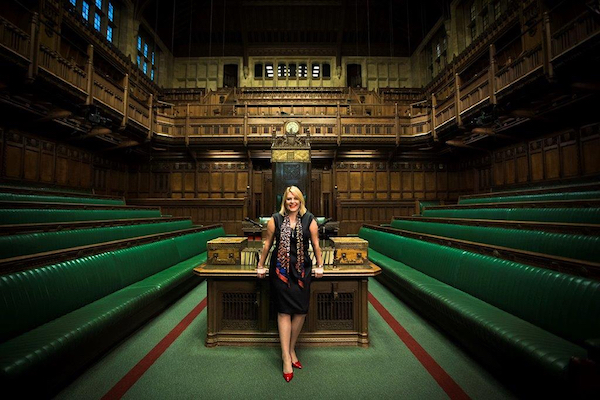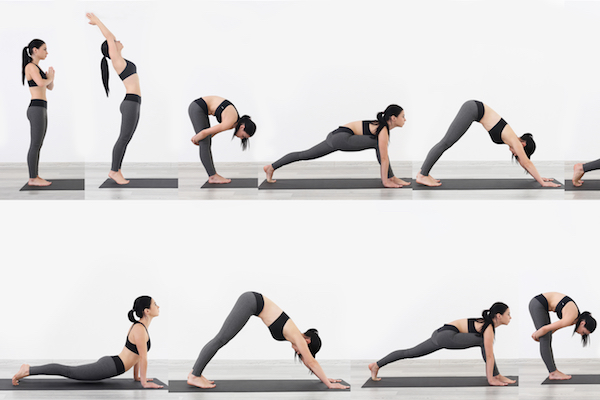
Mims Davies is the Conservative MP for Mid Sussex and has been an MP since May 7th 2015. She is currently the Parliamentary Under-Secretary for the Department for Work and Pensions and was a member of the Women and Equalities Select Committee. Mims was the first person in her family to attend university, where she studied politics, and she has two children.
We caught up with Mims during a very busy period within government and fired off some questions.
Welcome to Dynamic Magazine Mims. What made you decide to go into politics and, after stepping away to care for your children, what made you return?
Community issues are what made me want to go into local politics. I was frustrated at local playground facilities and the next thing I was a parish Councillor having been co opted in. I was elected in Eastleigh, as the first Conservative and Woman MP in 22 years - my life turned around quickly and unexpectedly. I found as my children grew up their lives and interests in Sussex were important to them and balancing this and my constituency role was more tricky as a single parent by that time. I thought I was leaving politics for good but
serendipity meant I was able to apply for my home seat and I was the first MP in over 10 years to be allowed to do this. This was truly unexpected as I had hoped my political time wasn’t fully over - just on a hiatus and this proved to be a very short break to my surprise! It has been a real rollercoaster, but life has funny ways of helping you out as well as challenging you and I am grateful for the political journey I have had. We want ‘real’ people in politics and life inside and outside of public service can be an unexpected journey. I have learnt from every part of it and I am thankful for the opportunities, friendship and experiences I have had representing constituents and businesses and am delighted to carry on.
So many women in business face quite a daunting task getting ahead, having to deal with not only incumbent males and possibly outdated attitudes but also with an unfair burden landing on their shoulders with home, childcare, elderly parent caring etc that, often, it is a wonder any women makes it to the top at all. What was your experience - good and bad?
I have found the men in politics to be generally fantastically encouraging, engaging and really open minded. I was encouraged to apply for seats by my former local Party Chairman, who saw a younger woman with small children as perfectly able to progress at a time I simply could not see it for myself. I have been a ‘sandwich carer’ for both my elderly parents alongside caring for my small children and I know how difficult a career alongside this is can be and what impact it can have as you try not to drop any balls.
My Dad ran his own business and was attacked at work and it massively affected our family and our finances, it meant he was most encouraging about being self sufficient and ready for anything life throws at you. I was self employed for 13 years and worked in the radio industry which was quite male dominated at that time and you had to be self starting and able to navigate this positively. I have though found that if you are good enough you be will get there and be welcomed. I don’t ever want to be the token woman at the table. But I always want to make sure the path opening up for me means I help it to be easier for others to break through the barriers and learn the skills they need. Your background, your health conditions, your network, your education, your ethnicity and your confidence can all maybe hold you back. But what we do know the broader mix of people at the table making decisions leads to more opportunity, more inclusion and more understanding and most importantly more success.
In your position on the Women & Equalities Select Committee, what do you feel is your greatest achievement, or that of the Committee in general, and what more would you like to do to assist women in the workplace?
This was a ground breaking committee and it was the first time Government policy was finally being looked at in this lens. We were the first Parliament in the globe to look at trans rights and this has really helped us to look at all equalities. The pregnancy and maternity discrimination enquiry was so eye opening as this area is still so fraught and disappointing for mothers and that was surprising and unsettling. Reality we found, is presenteeism and was hugely prevalent and affected women greatly. Networking too was very male focussed, playing golf on a Friday afternoon so Covid has done all women a favour and workplaces and engagement has now changed a lotsince I was on this committee in 2015. I was very proud to be the Chair of the All Party Women in Parliament and used my time to push for more debate and focus on International Women’s Day in the UK and help women into politics. I now realise it’s not just getting in that’s the challenge it’s the staying in and progressing once you are there. This is annually the 8th March, also my youngest daughter’s birthday. She is proudly an ‘International Woman’. But knows on that day mum is always speaking and marching. I was so proud to have my girls by my side marching 100 years on from the Women’s vote to Westminster from Hyde Park.
You voted to leave the EU – why, and have you had any regrets over that decision?
I was never a strong anti-EU politician. I did not come into politics with this as a driving force it was about community issues, life chances and opportunities for people no matter what their background and to help people know and understand their skills. I did not campaign to leave, and I didn’t get stuck into the campaign. I was a new MP at the time and thought it was right for us to all re-examine our relationship with the EU and look at the values and benefits. That is certainly the message I got on the doorsteps. People were keen to look at this relationship and what, in a more global economy, we could achieve by being able to negotiate on our own. What I have learned as a Minister at G20 meetings on the labour market and other events it’s clear countries from across the globe respect and value us and want to work with us and share knowledge. I recently met as Employment Minister, the ‘five eyes group’ – us, USA, Canada, Australia and New Zealand and sharing insight, impacts, interventions and ideas on Covid recovery was really positive and it shows that we must maintain a good relationship as broadly as possible in a changing world full of changing issues and threats.
Do you feel the current pandemic will make it a better or worse decision to leave the EU?
We have left the EU and the next vital stage is our future relationship as we move on from this transition period. All the decisions the Government has made to support the economy and our recovery has been done as a sovereign nation. The pandemic has shown that we have the resilience we needed, and our no deal plans made it easier for us to react as we had broad ranging Departmental continuity plans. My Department, the DWP, has done a huge job supporting people who unexpectedly needed our help. We were able to act digitally quickly to help people. We should have confidence now that we can get through any challenge and learn from it. This pandemic put a handbrake on our economy and our labour market and we are now pushing for a greener recovery, taking the good and learning from this. It’s taught government, businesses and families we all need resilience in our structures and to plan for the unexpected. It’s a difficult time for many and we will do all we can to give people the opportunities to build back stronger.
Did your previous life in local radio give you any insights into what you wanted to achieve as an MP?
A huge amount! The understanding of what the media are looking for. A great network of friends on the other side of mic and camera lens too. Knowing how competitive it can be to get to where you want to be. Being able to get stuck in on something that changes everyday and connecting with people is key. Ability to learn things quickly and speak with authority swiftly. I loved every second of broadcasting and this role is so similar.
Regarding the current pandemic, what more could government do to assist with the huge pain being felt in businesses across the South East? With considerable gaps in the Chancellors recent funding spree, there are a significant number of businesses on the brink – is there anything under consideration to help further?
Throughout the pandemic, the UK Government has acted with urgency to protect lives and safeguard jobs in the speediest way possible. The first stage was a £160 billion support package, which included paying the wages of nearly 12 million people and supporting over a million businesses through grants, loans and rates cuts. Our support for those who are self-employed is far more comprehensive, generous and longer lasting than pretty much any other country but we have been honest we can’t do everything people hope and protect every business and every job. The Self-Employment Income Support Scheme brought forward by HMT, remains open for applications for the second and final grant until 19 October. Now, as the UK enters the second phase in its recovery, the Chancellor’s plan is fully designed to support jobs by focusing on skills and young people, creating roles with investment in shovel-ready projects and in greening our infrastructure, and protecting employment through a VAT cut for the hospitality sector plus the landmark Eat Out to Help Out discount scheme for diners. This has been hugely successful in getting people back into local pubs, restaurants, towns and villages and was a brilliant idea to help boost the flagging hospitality sector as well as help people to get out and be Covid safe. We know this is a three-phase plan to a greener recovery, which many constituents want as we push to build back stronger with more resilience.
Do you feel it would make more sense, economically, to extend the furlough scheme into 2021 rather than suffer the massive cost of the coming surge in unemployment? For the next decade at least, there will be a significant increase in the long-term unemployed and do you feel that the best way to stop that is to keep people in their jobs?
Let’ s be honest with this challenge, in the long term the particular restrictions of the furlough scheme are not healthy for the employee or for the economy. You are keeping people in suspended animation and stopping them from actually working and progressing. Unfortunately, we cannot protect every job, but we do believe the Job Retention Bonus will play a vital role in supporting employers to bring their furloughed staff back to work to protect jobs and help support our economic recovery. Without such action, more jobs would be at acute risk. But prior to the pandemic, employment rates were at a record high, I want us to be at that level again and as Employment Minister, I’ll do everything I can to ensure we get back there. My department, DWP, is playing a truly vital role in supporting people back into employment quickly, by doubling the number of work coaches across our nationwide network of jobcentres to 27,000, launching our new £2bn Kickstart Scheme for young people and injecting £150m into our Flexible Support Fund so jobcentres can put in place the right support for their local communities such as mentoring circles, training and partnerships with employers. I am so proud to be the Minister delivering these interventions. In addition to increasing participation in our Sector-based work programmes by 40,000 places – in care, in construction and other growing areas. And for those that have been out of work for a longer period of time, we’re developing a new large scale support offer which will commence next year as the impact unwinds and we can target our support. This is a enormous role in the Government right now and I am aware of this huge challenge and we have to get back to our pre Covid success.
Why did the government put the coronavirus discretionary grant fund into the hands of local councils? There is a coming storm about how they distributed those funds. Certain councils generally made some very odd decisions as to whom they awarded and what rules they followed, that have greatly harmed the regional economy and many businesses chance of survival. There is a growing lobby to review these decisions?
Our local councils have played a really vital local role in the government’s response to the pandemic and are best placed to make decisions on the needs of their local communities. That’s why they have the power to decide how £3.7 billion emergency funding from Government is spent and to distribute the funds where it is needed most. We will continue to work closely with our councils as they support their communities. I have really got stuck in with our local council to make sure we support viable businesses via the discretionary grants, guided those to them who though they may not be entitled to help and tried to do all I can via my casework team. Our local council Mid Sussex has been impeccable in its hard work and commitment to help all they can.
What advice would you give to a young woman entering business and/ or politics today about how to survive, how to thrive and how to realise her dreams?
Please go for it! Don’t hold back on what you believe in and care about. Having said that don’t feel you have to rush, every single bit of your experience will help you succeed and achieve those dreams. Be prepared to sometimes be the only woman in the room but hold your own and know you bring a unique view because of that maybe. Careers now are a life of jobs and not a job for life so be prepared to be ready to pivot, up and re skill, adapt and react to a changing world of work. I am determined in my role at the DWP to make it easier for people to progress, set up businesses and work flexibly and in the gig economy alongside government support and not get stuck. I have had amazing chances in politics as Sports Minister getting the funding for Birmingham 2022 Commonwealth Games, to guiding through the Ivory Act to protect Elephants worldwide as the DEFRA Whip and attending the G20 in Japan as Employment Minister. But it took me 18 months to be brave enough to fill out the form to be an MP and I know how much confidence matters to help you survive the rough times. So build it and your chances will flow from it. Believe you will get there, loving it all the more because of both the learning experience from the challenges of the lows as well as the chance to really cherish the highs.





